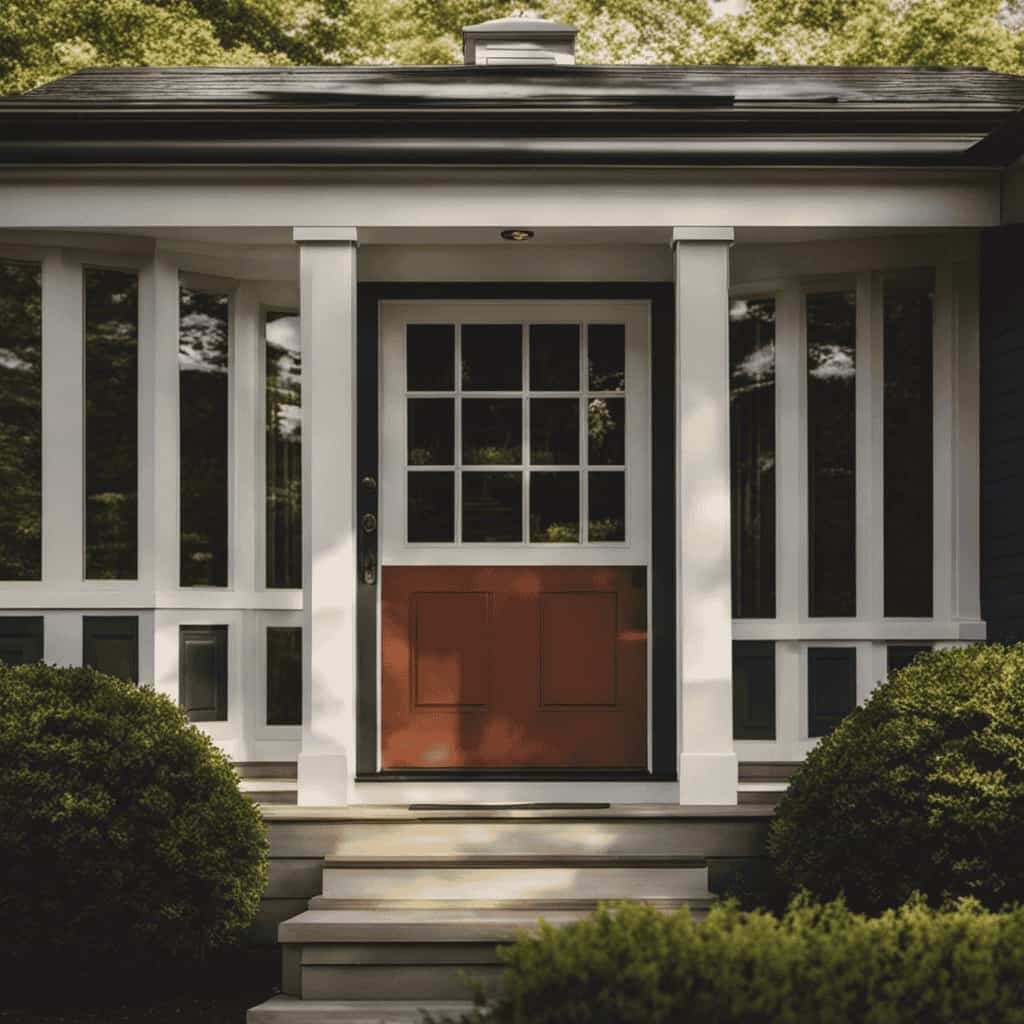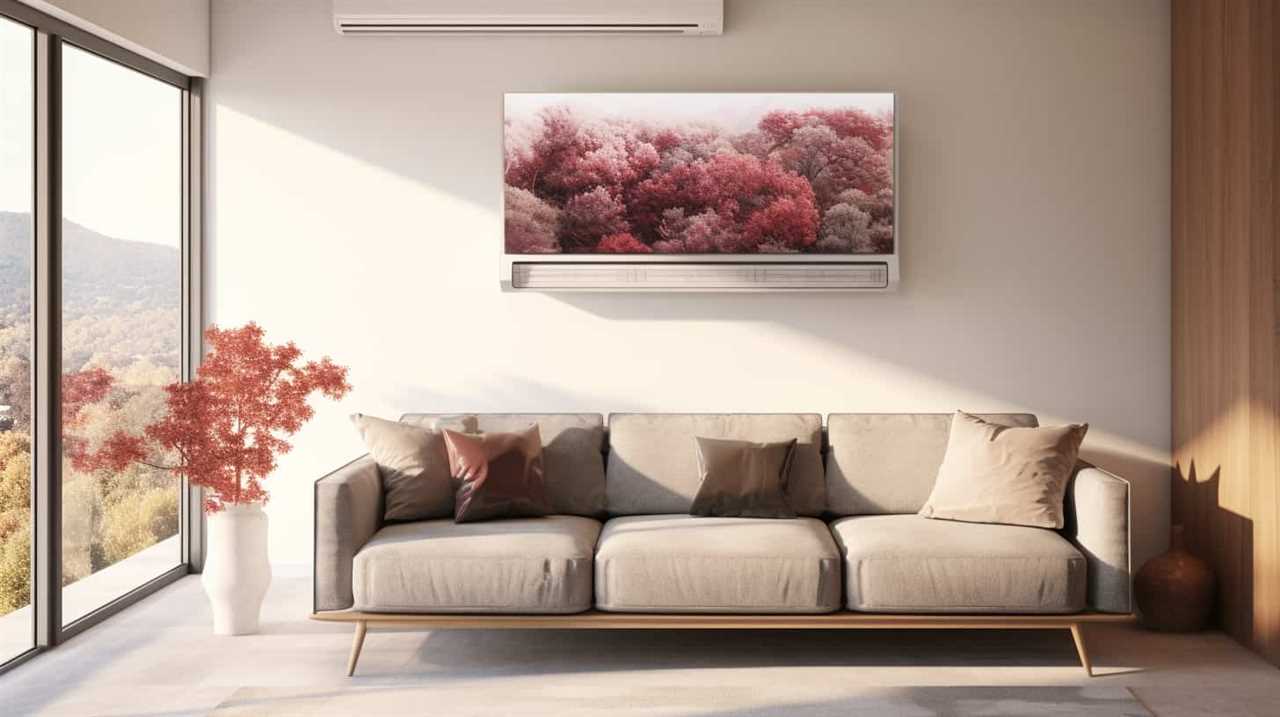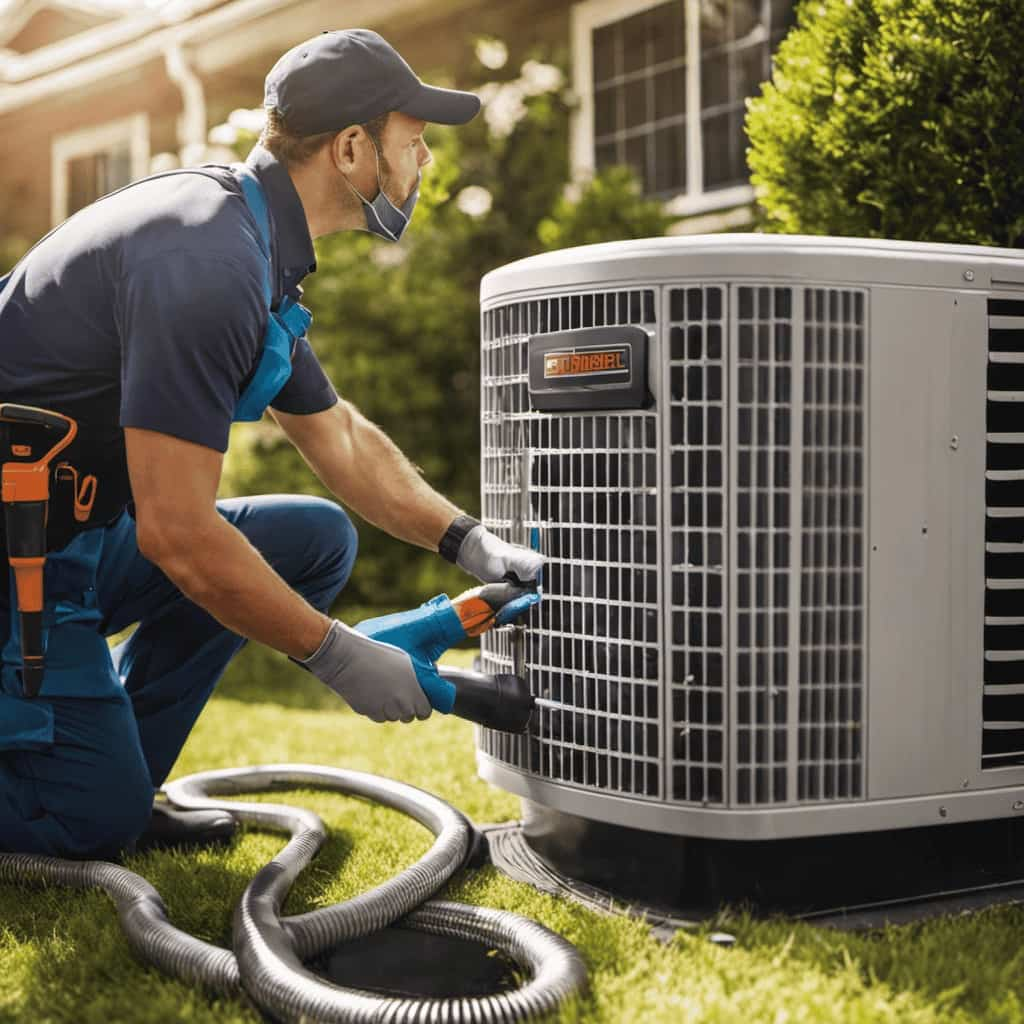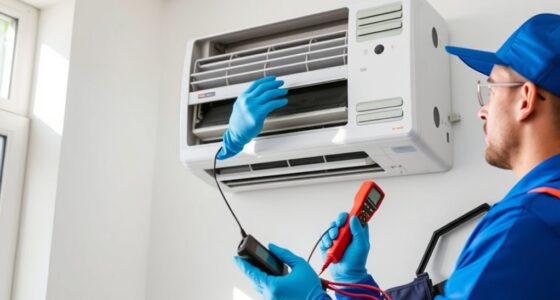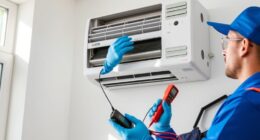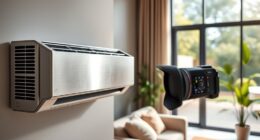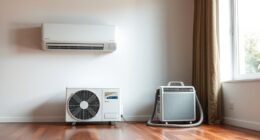Fed up with overheating in the summer and freezing during the winter? Search no more, as we present to you the definitive guide on selecting the ideal air conditioning heat pump!
In this article, we’ll break down the basics, factors to consider, sizing, energy efficiency, types, noise levels, installation, maintenance, and even how to find the best deal.
Let’s dive in and find the ideal air conditioning heat pump that will keep you comfortable all year round!
Key Takeaways
- Air conditioning heat pumps provide both cooling and heating and are energy-efficient and environmentally friendly.
- Factors such as outdoor temperature, space size, insulation, and proper sizing, installation, and maintenance are crucial when choosing a heat pump.
- Noise level and energy efficiency ratings should be considered, and professional consultation is recommended.
- Types of heat pumps include air source, ground source, and ductless heat pumps, and comparing prices, prioritizing features, researching brands, finding reputable dealers, and considering long-term costs are important factors to consider.
Understanding the Basics of Air Conditioning Heat Pumps
We’ll start by explaining the key components of air conditioning heat pumps. Air conditioning heat pumps are highly efficient systems that provide both cooling and heating for homes and buildings. They consist of four main components: the compressor, the condenser, the expansion valve, and the evaporator. These components work together to transfer heat from one area to another, depending on the desired temperature.

Factors affecting the performance of air conditioning heat pumps include the outdoor temperature, the size of the space being cooled or heated, and the insulation of the building.
Additionally, the benefits of heat pump technology are numerous. They’re energy-efficient, saving homeowners and businesses money on their utility bills. Heat pumps also provide consistent and comfortable indoor temperatures all year round. They’re environmentally friendly, as they use less electricity and produce fewer greenhouse gas emissions compared to traditional heating and cooling systems.
Factors to Consider When Choosing an Air Conditioning Heat Pump
When considering an air conditioning heat pump, there are several factors to keep in mind. Here are three important considerations to help you make the right choice:
-
Sizing considerations: It’s crucial to select a heat pump that’s properly sized for your space. A unit that’s too small may struggle to cool or heat your home efficiently, while one that’s too big will consume excessive energy. Consider factors such as the size of your space, insulation levels, and climate conditions to determine the appropriate size.

-
Installation: Proper installation is key to ensuring optimal performance and longevity of your air conditioning heat pump. It’s recommended to hire a professional HVAC technician who can accurately install the unit, ensuring it’s positioned correctly and all connections are secure.
-
Maintenance: Regular maintenance is essential to keep your heat pump running smoothly. This includes tasks such as cleaning or replacing filters, inspecting coils, and checking refrigerant levels. Following the manufacturer’s guidelines and scheduling professional maintenance checks will help extend the lifespan of your heat pump.
Considering these factors will help you make an informed decision when choosing an air conditioning heat pump. Now, let’s delve into the next section and explore how to size your heat pump for optimal performance.
Sizing Your Air Conditioning Heat Pump for Optimal Performance
When sizing an air conditioning heat pump for optimal performance, there are several factors that need to be considered.
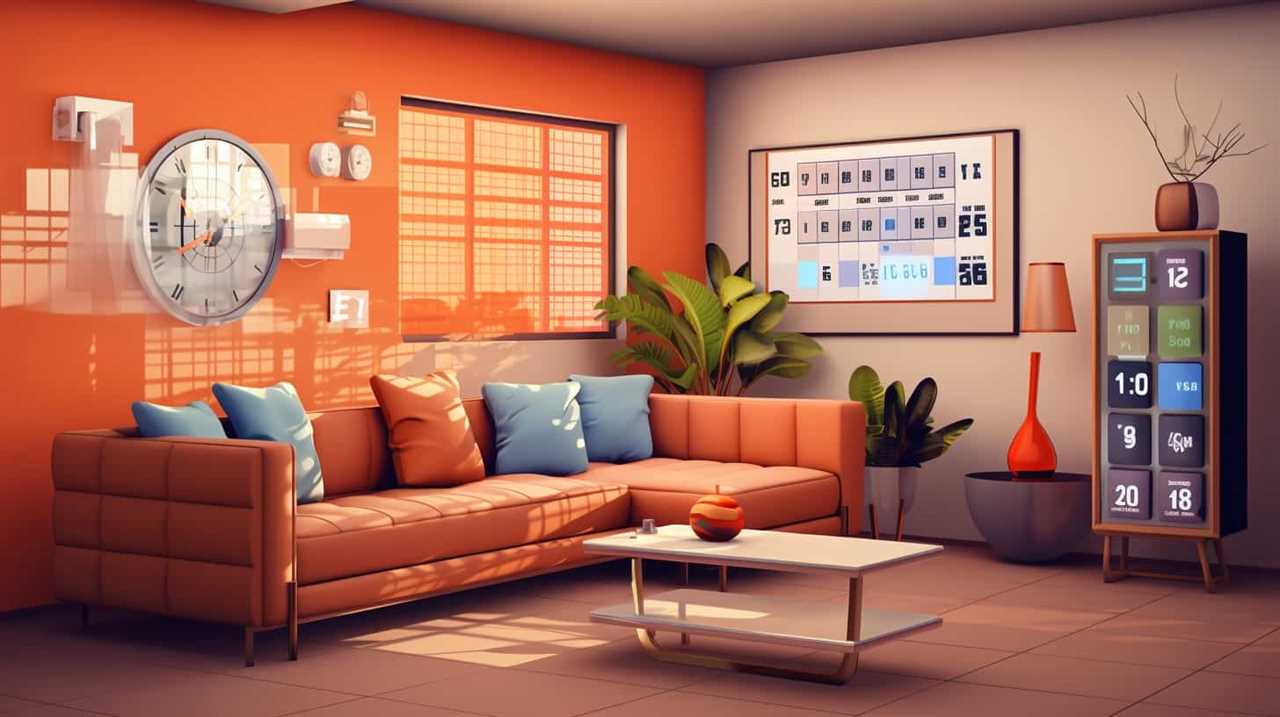
These factors include:
- The size of the space being cooled or heated
- The climate in which the pump will be used
- The insulation of the building
Calculating the optimal capacity of the pump requires taking into account these factors, as well as the desired temperature range and the number of occupants in the space.
Additionally, energy efficiency considerations should also be taken into account to ensure that the pump operates efficiently and minimizes energy consumption.
Factors Influencing Pump Size
To ensure optimal performance, it’s important to consider several factors when sizing your air conditioning heat pump. Here are three key considerations:
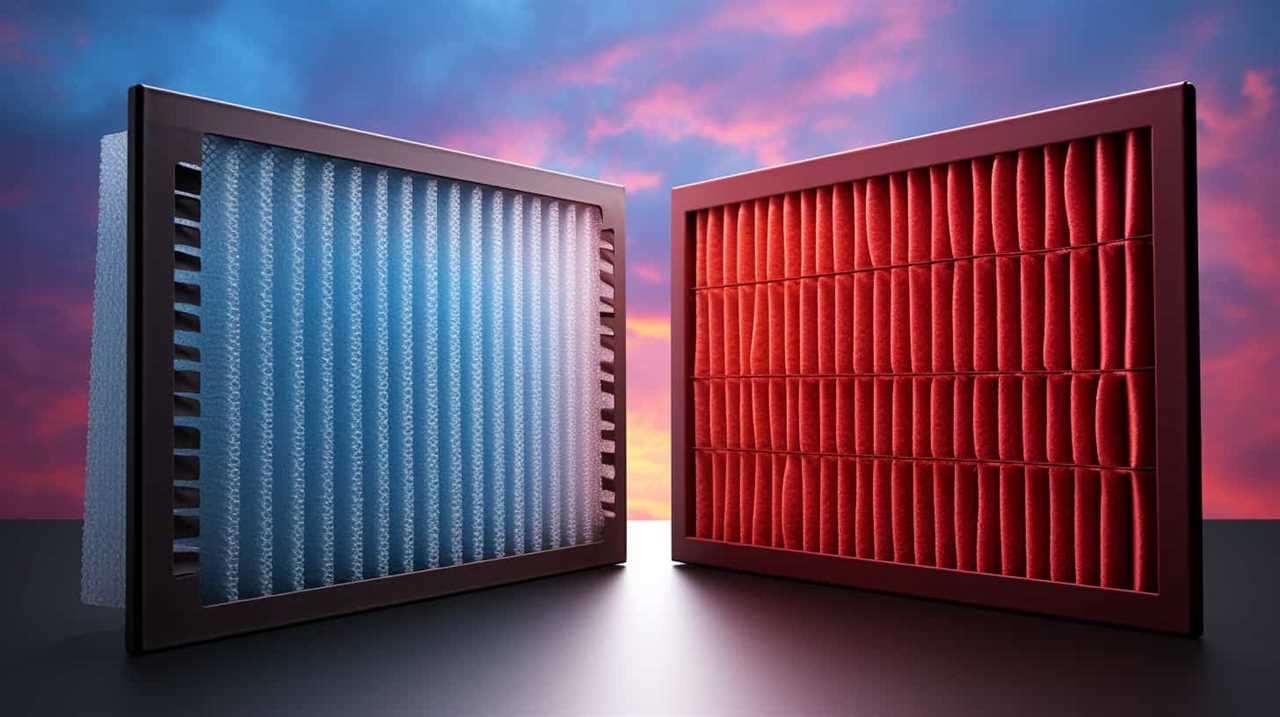
-
Factors affecting pump efficiency: The efficiency of your heat pump is influenced by various factors, such as the type and size of the compressor, the heat exchanger design, and the overall system layout. Choosing the right components and configurations can significantly impact the pump’s efficiency.
-
Impact of climate on pump size: The climate in which your heat pump will operate plays a crucial role in determining its size. In colder climates, the heat pump needs to work harder to provide sufficient heating, which may require a larger unit. Conversely, in warmer climates, a smaller unit may be sufficient to meet cooling demands.
-
Load calculation: Properly sizing your heat pump requires a thorough load calculation, taking into account factors like the size and layout of the space, insulation levels, and the number of occupants. This calculation ensures that the heat pump is adequately sized to meet the heating and cooling needs of your specific environment.
Considering these factors when sizing your air conditioning heat pump will help you achieve optimal performance and energy efficiency.
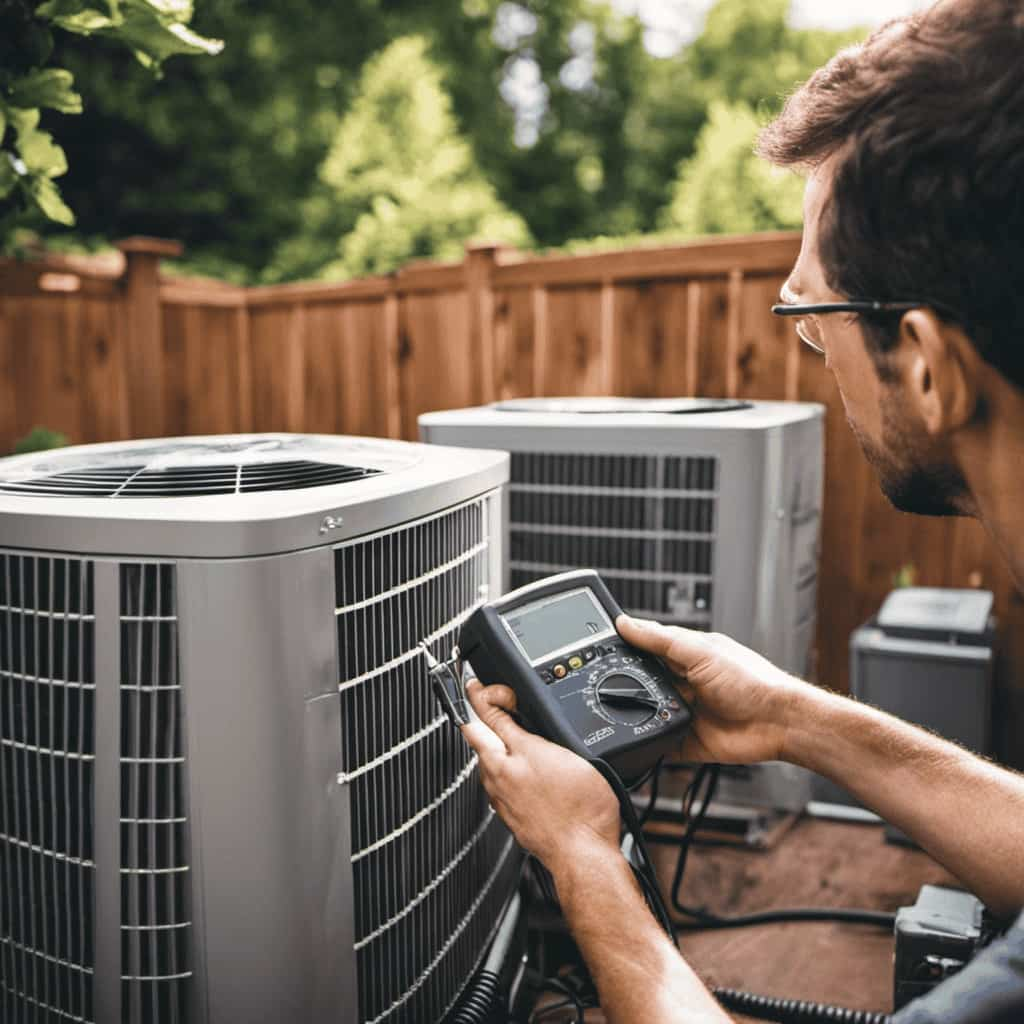
Calculating Optimal Capacity
For optimal performance, we need to calculate the optimal capacity when sizing our air conditioning heat pump.
Calculating the optimal capacity involves determining the right size of the heat pump to ensure efficient and effective cooling and heating. One key factor in this calculation is the efficiency of the heat pump.
By analyzing the energy consumption of different heat pump models, we can determine their efficiency levels and choose the one that provides the most efficient performance for our specific needs.
It’s important to consider both cooling and heating requirements when calculating the optimal capacity. This analysis ensures that the heat pump isn’t oversized or undersized, leading to energy wastage or inadequate heating and cooling.
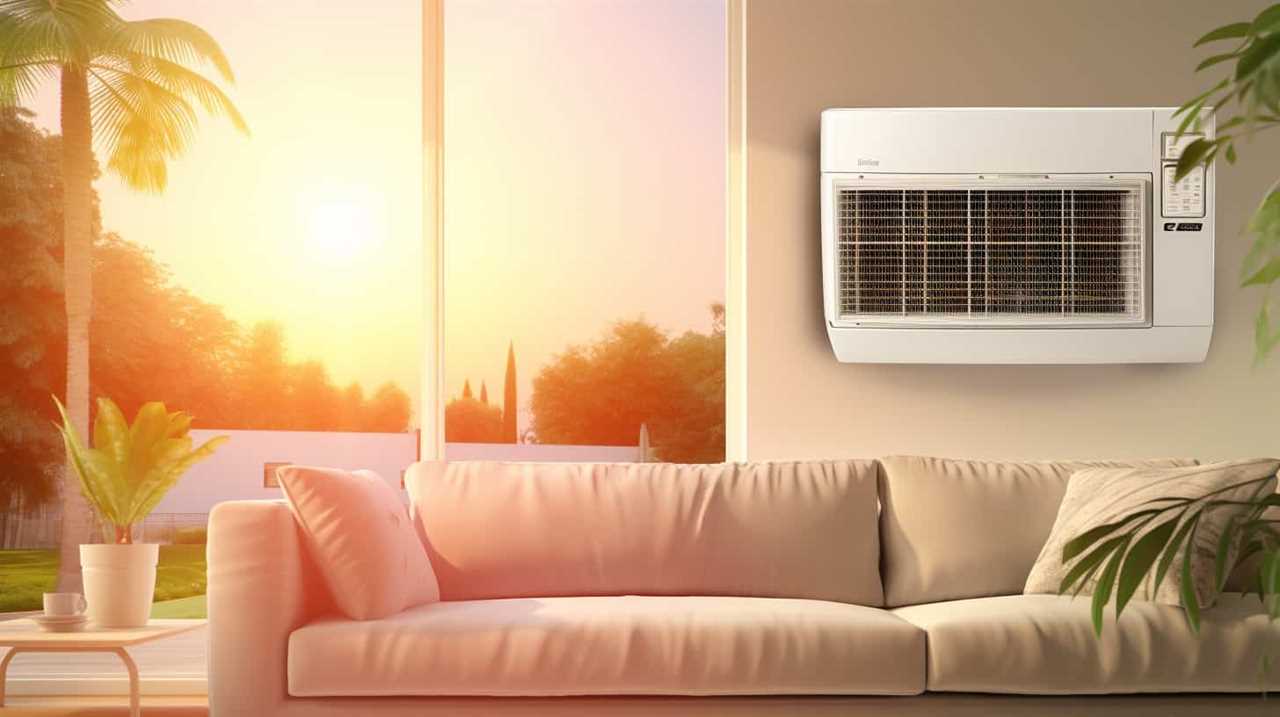
Energy Efficiency Considerations
As we consider energy efficiency, we must size our air conditioning heat pump for optimal performance. Choosing the right size is crucial in improving energy efficiency and ensuring that your system operates at its peak efficiency.
Here are three key considerations when it comes to sizing your air conditioning heat pump:
-
Room size: The square footage of the room or area you want to cool is an essential factor in determining the right size. A unit that’s too small may struggle to cool the space effectively, while an oversized unit may cycle on and off frequently, wasting energy.
-
Insulation: The level of insulation in your home affects how well it retains cool air. Proper insulation reduces energy loss and helps the air conditioning heat pump work more efficiently. Consider the insulation quality when sizing your unit.
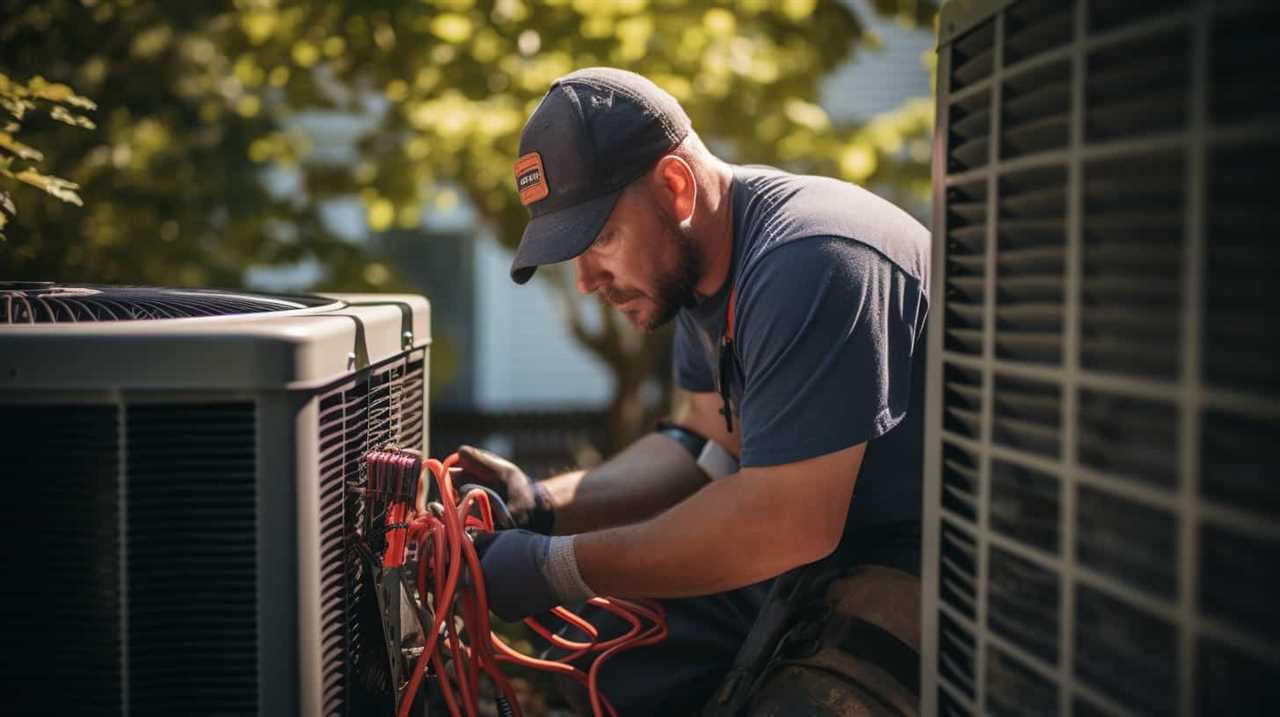
-
Climate: The climate in your area plays a significant role in determining the size of your air conditioning heat pump. Hotter climates may require a larger unit to provide adequate cooling, while milder climates may allow for a smaller unit.
Energy Efficiency: Finding a Heat Pump With High SEER and HSPF Ratings
When it comes to energy efficiency in air conditioning heat pumps, two key ratings to consider are SEER (Seasonal Energy Efficiency Ratio) and HSPF (Heating Seasonal Performance Factor).
The SEER rating measures the cooling efficiency of the heat pump, while the HSPF rating measures its heating efficiency.
High SEER and HSPF ratings are important because they indicate that the heat pump can provide efficient cooling and heating, resulting in lower energy consumption and cost savings for the homeowner.
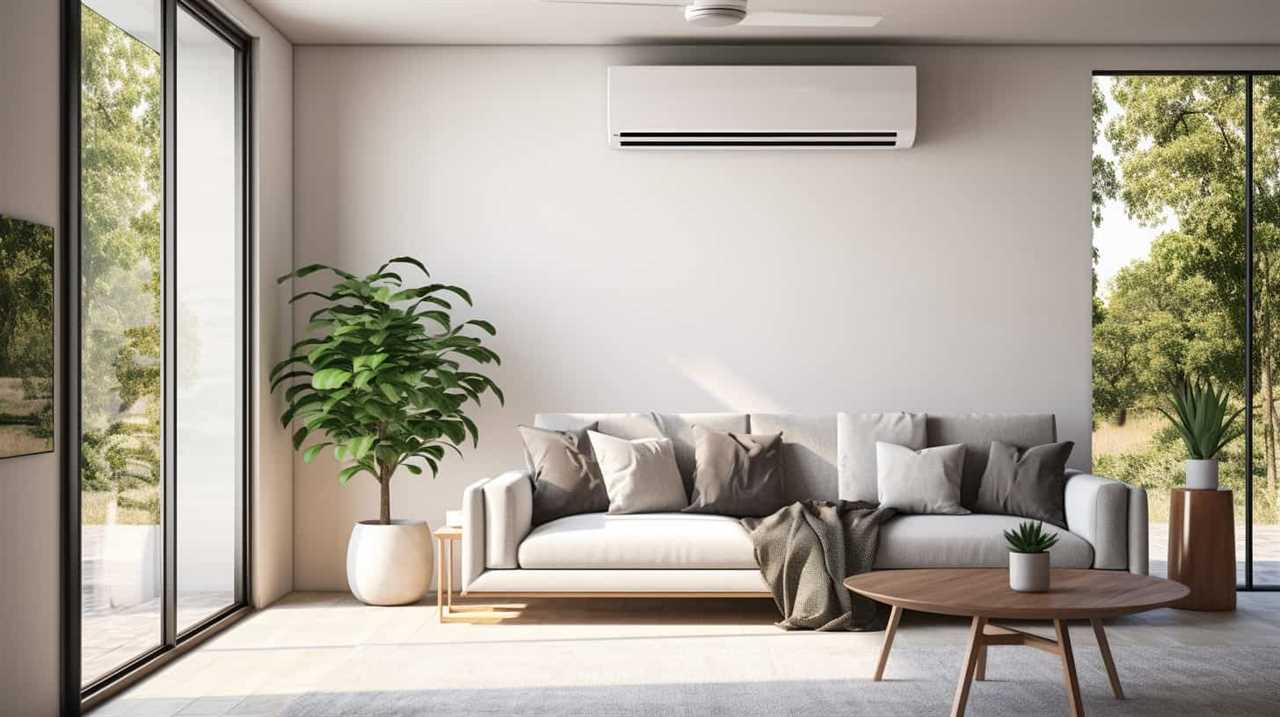
SEER Vs HSPF: Differences
We prioritize energy efficiency when selecting a heat pump, focusing on high SEER (Seasonal Energy Efficiency Ratio) and HSPF (Heating Seasonal Performance Factor) ratings. Understanding the differences between SEER and HSPF is crucial in finding the most efficient heat pump for your needs.
Here are three key points to consider:
-
SEER vs HSPF: Efficiency Comparison: SEER measures the cooling efficiency of a heat pump, while HSPF measures its heating efficiency. Both ratings are important indicators of energy efficiency, allowing you to compare different models and choose the one that best suits your climate and usage requirements.
-
SEER vs HSPF: Impact on Energy Consumption: A heat pump with a higher SEER rating will consume less energy during cooling, resulting in lower energy bills. Similarly, a heat pump with a higher HSPF rating will consume less energy during heating. By selecting a heat pump with high SEER and HSPF ratings, you can reduce your energy consumption and minimize your environmental impact.
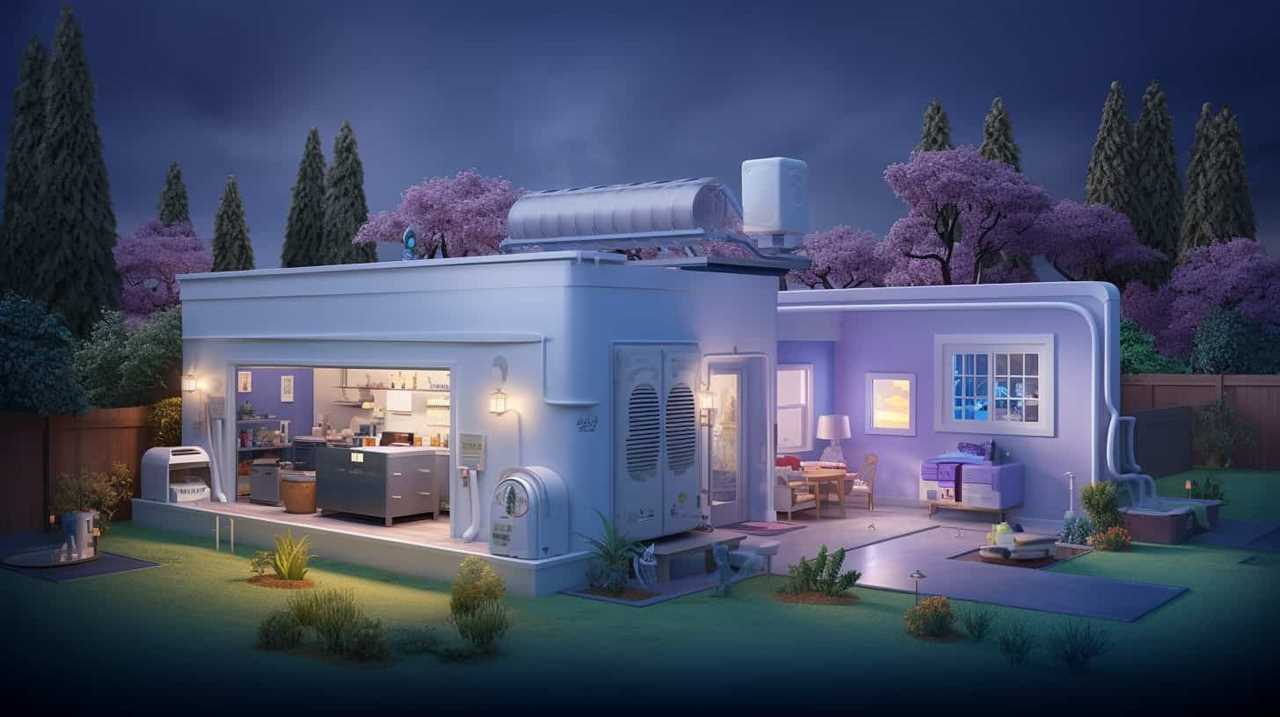
-
Finding the Right Balance: When choosing a heat pump, it’s important to strike a balance between SEER and HSPF ratings. Consider your climate and usage patterns to determine the optimal balance between cooling and heating efficiency. Consulting with a professional will help you find the perfect heat pump that meets your energy efficiency needs.
Importance of High Ratings
To maximize energy efficiency, we prioritize heat pumps with high SEER and HSPF ratings. Energy efficiency ratings have a significant impact on long-term cost savings.
When choosing a heat pump, it’s crucial to consider the SEER rating, which stands for Seasonal Energy Efficiency Ratio. The SEER rating measures the cooling efficiency of the heat pump. The higher the SEER rating, the more energy-efficient the heat pump is, leading to lower energy consumption and reduced utility bills. Choosing a heat pump with a higher SEER rating can result in substantial savings over time.
In addition to SEER, another important rating to consider is the HSPF rating, which stands for Heating Seasonal Performance Factor. The HSPF rating measures the heating efficiency of the heat pump. Similar to SEER, a higher HSPF rating indicates better energy efficiency and lower operating costs.

Exploring Different Types of Air Conditioning Heat Pumps
Let’s dive into the various types of air conditioning heat pumps available in the market.
Here are three types of heat pump technology you can consider:
-
Air Source Heat Pumps: These pumps extract heat from the outdoor air and transfer it indoors. They’re cost-effective and suitable for moderate climates. However, their efficiency may decrease in extremely cold temperatures.
-
Ground Source Heat Pumps: Also known as geothermal heat pumps, these systems use the stable temperature of the ground to heat or cool your home. They provide consistent performance, high energy efficiency, and long-term savings. However, their installation costs can be higher.
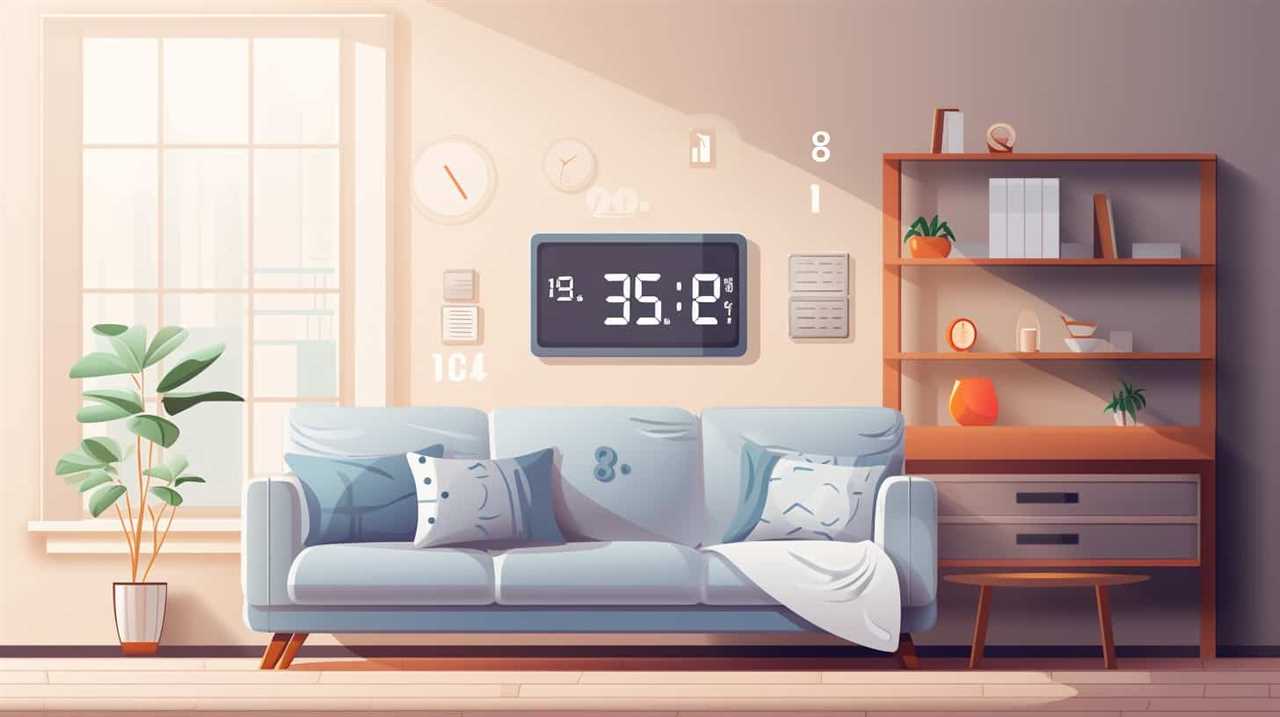
-
Ductless Heat Pumps: These compact and versatile systems are easy to install and provide zoned heating and cooling. They eliminate the need for ductwork and allow personalized comfort in different areas of your home. Ductless heat pumps are energy-efficient, quiet, and provide excellent indoor air quality.
Exploring these different types of air conditioning heat pumps will help you make an informed decision when selecting the perfect system for your home.
Assessing the Noise Levels of Air Conditioning Heat Pumps
Assessing the noise levels of air conditioning heat pumps can help us determine the most suitable option for our home. Evaluating performance and minimizing vibration are essential factors to consider when selecting an air conditioning heat pump. To assist you in making an informed decision, here is a table showcasing the noise levels of different heat pump models:
| Heat Pump Model | Noise Level (dB) | Performance Rating | Vibration Level |
|---|---|---|---|
| Model A | 50 | Excellent | Low |
| Model B | 60 | Good | Medium |
| Model C | 70 | Average | High |
| Model D | 80 | Poor | Very High |
As you can see, each model varies in terms of noise level, performance rating, and vibration level. It is crucial to find a balance between low noise levels, excellent performance, and minimized vibration. By evaluating these factors, you can select an air conditioning heat pump that ensures a comfortable and peaceful environment in your home.
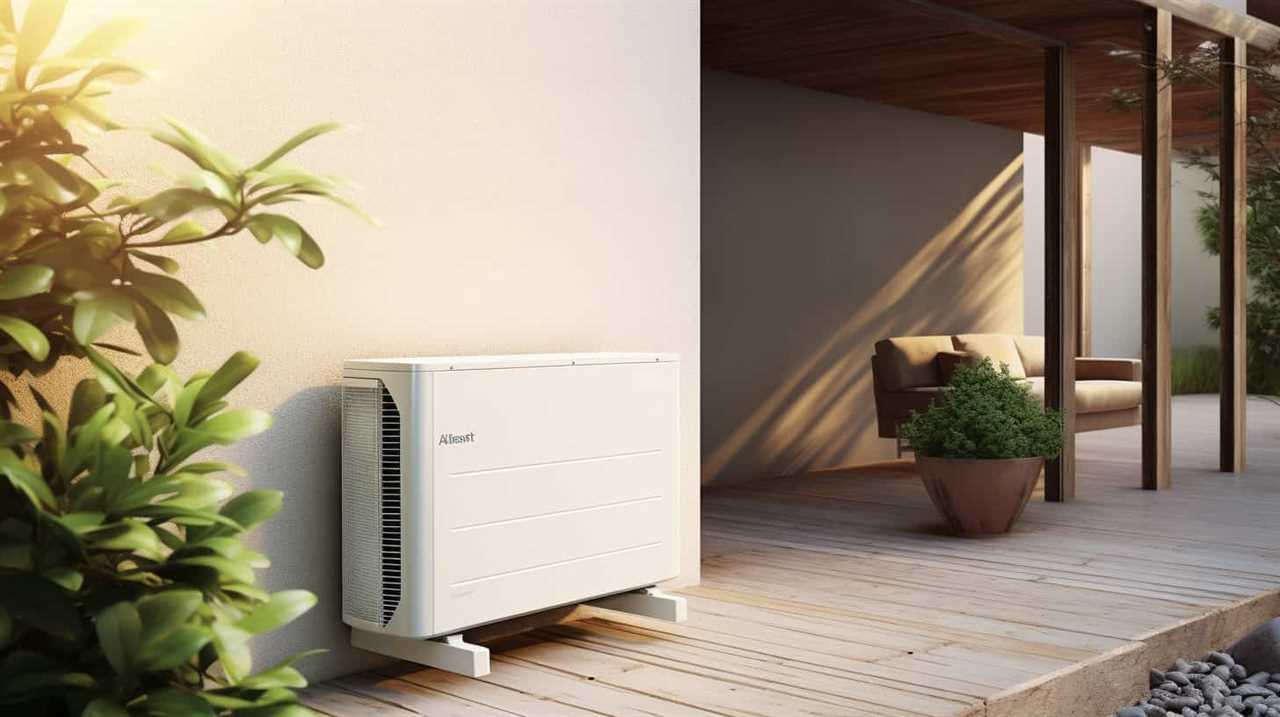
The Importance of Proper Installation and Maintenance for Heat Pumps
We must prioritize proper installation and maintenance to ensure the optimal performance and longevity of our heat pumps.
When it comes to heat pump installation, it’s crucial to hire a professional to ensure it’s done correctly. Common installation mistakes, such as improper sizing, incorrect refrigerant charge, or inadequate ductwork, can lead to reduced efficiency and frequent breakdowns.
Regular maintenance is equally important to keep the heat pump running smoothly. By scheduling regular inspections and tune-ups, you can identify and address any issues before they become major problems. Benefits of regular maintenance include improved energy efficiency, extended lifespan of the heat pump, and enhanced indoor air quality.
Comparing Prices and Getting the Best Deal on an Air Conditioning Heat Pump
When comparing prices and looking to get the best deal on an air conditioning heat pump, it’s important that we consider our budget and prioritize features that align with our specific needs.

One crucial aspect of comparing prices is evaluating different brands. It’s essential to research and compare the reputation, reliability, and performance of various brands. This will help us identify the brands that offer the best value for our money.
Additionally, finding reputable dealers is equally important. Reputable dealers not only offer competitive prices but also provide excellent customer service and support. They can guide us in selecting the right air conditioning heat pump for our requirements and ensure a smooth installation process.
Frequently Asked Questions
How Often Should I Clean or Replace the Air Filters in My Heat Pump?
We clean or replace our air filters in the heat pump at regular intervals to ensure optimal performance. It’s important to follow manufacturer guidelines for cleaning frequency and replacement timeline to maintain air quality and efficiency.
Are There Any Specific Maintenance Tasks That Homeowners Can Perform Themselves to Keep Their Heat Pump Running Efficiently?
Yes, there are several DIY maintenance tasks that homeowners can perform themselves to keep their heat pump running efficiently. However, it is also important to schedule regular professional maintenance to ensure optimal performance and prevent any major issues.
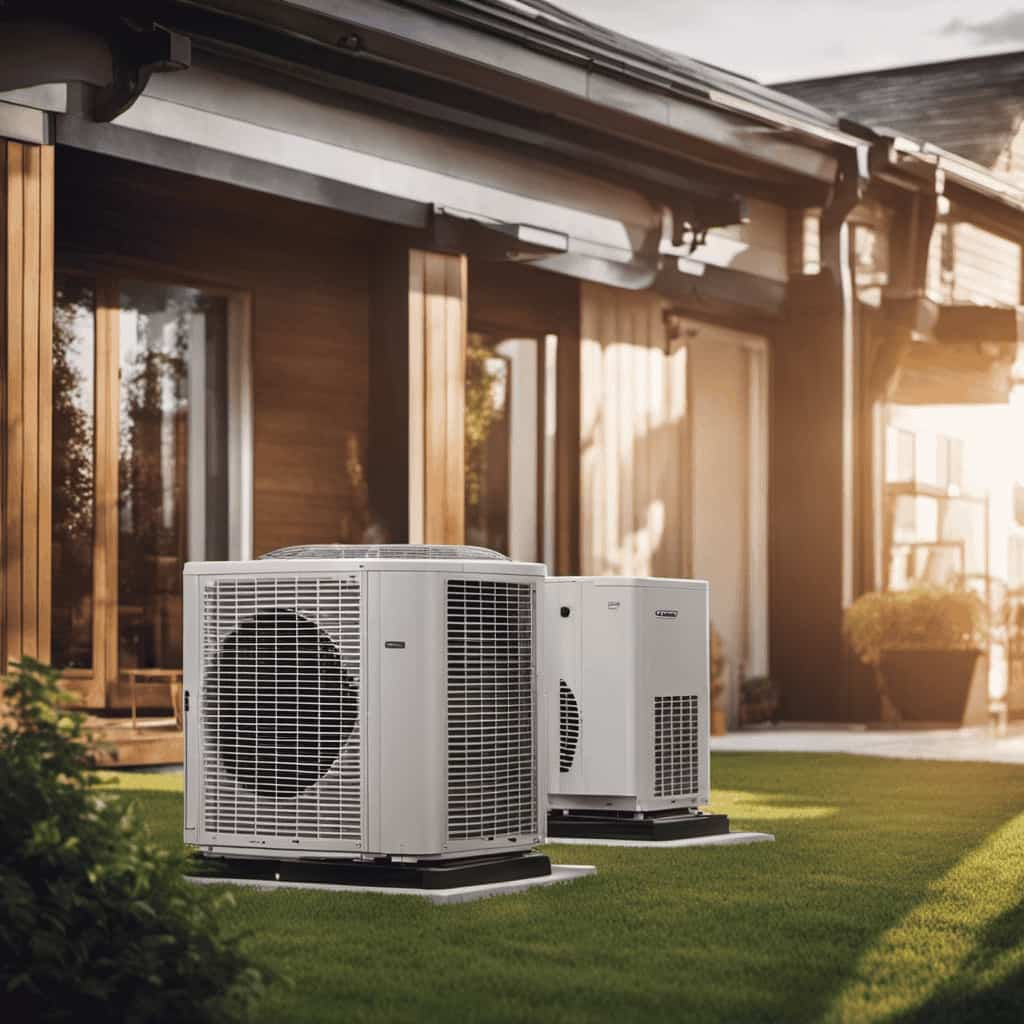
Can I Use My Heat Pump as Both a Heating and Cooling System?
Yes, you can use a heat pump for both heating and cooling. The pros include energy efficiency and year-round comfort. However, using separate systems may be more cost-effective in certain cases.
Are There Any Government Incentives or Rebates Available for Purchasing an Energy-Efficient Heat Pump?
Yes, there are government incentives and rebates available for purchasing an energy-efficient heat pump. These incentives aim to promote energy efficiency and can help offset the cost of the heat pump.
How Long Can I Expect My Heat Pump to Last Before Needing to Be Replaced?
When it comes to the longevity expectations of a heat pump, it’s important to consider signs of failure. Regular maintenance and proper usage can help extend its lifespan, but typically, you can expect a heat pump to last around 15 to 20 years.
Conclusion
In conclusion, choosing the perfect air conditioning heat pump requires careful consideration of various factors such as sizing, energy efficiency, noise levels, and proper installation.

By understanding the basics and exploring different types, you can make an informed decision.
Don’t forget to compare prices and seek the best deal to ensure you get a high-performing heat pump that meets your needs.
Remember, the right heat pump can create a comfortable and efficient environment for your home or business.
